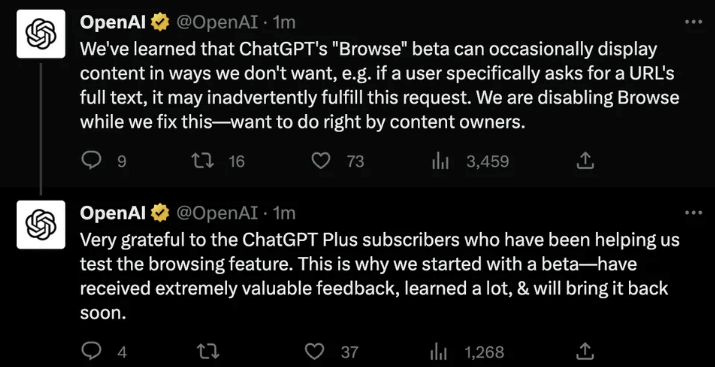Sign Up | Advertise | Tools | View Online
Happy Wednesday!
Today we’ve got some disappointing news for ChatGPT, controversial news from Google, and revolutionary news from Japan.
Let’s get into it.
In today’s AI rundown:
⚡️ OpenAI disables ChatGPT Web Browsing
🤖 Google now collects public data to improve AI
🇯🇵 Japan is prioritizing educating AI comprehension
🛠️ 5 New AI tools and 3 quick hits
Read time: 3 minutes
LATEST DEVELOPMENTS
OPENAI

Image source: Twitter @OpenAI
The Rundown: OpenAI has temporarily disabled the ‘beta‘ web browsing feature for ChatGPT Plus subscribers, which allows users to browse the real-time internet using ChatGPT.
Key points:
OpenAI claims the shutdown is due to its recently discovered ability to bypass paywalls on websites (covered on The Rundown here)
Some see OpenAI's move to disable the browsing feature as self-protection due to potential violations of content ownership rules
Alternatives include Perplexity Copilot, Microsoft Bing, and Google Bard
Our take: While it does suck that Web Browsing is disabled (it was great for research), the feature was in beta and OpenAI did say that it’s temporary. Regardless, it’s nice to see swift communication.
TOGETHER WITH INNOVATING WITH AI
The Rundown: Launching an AI product is no easy task. But Innovating with AI launched two new AI products in 1 month. Throughout the process, they created a free video lesson and cheat sheet to help teach you to do it yourself.
You’ll learn the following:
The AI Business Model Matrix: How to combine your skills, interests, and advanced AI tools in unique and exciting ways
The AI Venture Mindset: How to use rapid experimentation and industry uncertainty to your advantage
The AI Marketing Cookbook: Where to share and promote your new AI-powered business for maximum growth

Image source: Search Engine Journal
The Rundown: Over the long weekend, Google updated its privacy policy to allow the collection of any publicly shared online information, which will be used to enhance its AI models.
Key points:
Google can use any information people post publicly online, not just data provided directly
This shifts from Google's previous focus on improving "language" models to enhancing all its "AI" models
Analyzing people’s online posts using AI system poses privacy concerns
Ways to protect your data:
Use alternative services that prioritize user privacy (DuckDuckGo for search, ProtonMail for email, Vimeo for video sharing, and Brave for web browsing)
Use incognito or private browsing mode
Be mindful of the information you post publicly
JAPAN

Image source: Japan Times
The Rundown: Japan's Education Ministry released new guidelines emphasizing the need for students to understand artificial intelligence.
Details:
Students are advised against presenting AI-generated work as their own
AI is promoted for use in English learning and for teaching fact-checking skills
The guidelines recommend AI tools to reduce teachers' workloads
A survey revealed about 70% of parents believe regulations for AI chatbot use by children are necessary
Why it matters: In a world where AI is not just the future but the present, Japan's move to integrate it into education while also mitigating potential pitfalls isn't just smart; it's absolutely essential.
Many other countries will likely follow Japan’s lead shortly.
TRENDING TOOLS
✍️ gpt-prompt-engineer enables an AI agent to create optimal prompts
💬 YC Mentor lets you chat with a mentor with YCombinator knowledge
📈 Ween AI turns qualitative data into insights
🤟 Felo Translator facilitates real-time language translation
🐦 Tweet Hunter helps you build your Twitter following using AI tools*
🎥 Pictory creates short, highly-sharable branded videos from your long-form content*
🔮 Supertools organizes 100’s of AI tools for you in one spot
QUICK HITS
Celestial AI has raised $100 million in a Series B funding round for its Photonic Fabric platform. The investment, led by IAG Capital Partners, Koch Disruptive Technologies, and Temasek’s Xora Innovation fund, will help address the "memory-wall" challenge faced by AI models.
Artificial intelligence is promising significant advancements in weather prediction, with the potential for faster, cheaper forecasts of extreme conditions, though integration and trust hurdles persist.
Technology company Co-Star has developed a machine that uses artificial intelligence to provide astrological readings, challenging traditional methods but raising questions about trust and personalization.
SPONSOR US
🦾 Get your product in front of over 200k+ AI enthusiasts
Our newsletter is read by thousands of tech professionals, investors, engineers, managers, and business owners around the world. Learn more or get in touch today.
* This is sponsored content
THAT’S A WRAP
If you have anything interesting to share, please reach out to us by sending us a DM on Twitter: @rowancheung & @therundownai
How was today's newsletter?
❤️ Rundown review of the day



